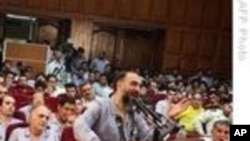<!-- IMAGE -->When he was sworn in for a second term, Iranian President Mahmoud Ahmadinejad vowed to lead his country to national greatness. One way a country achieves greatness is by living up to its word and honoring international obligations. Iran has been falling grievously short.
Iran, for example, was one of the original countries to ratify the Universal Declaration of Human Rights, which guarantees freedom of expression, peaceful assembly, and religion. It prohibits arbitrary arrest and torture and acknowledges every person's right to equal protection of the law and to an independent and impartial tribunal. But as recent months have dramatically shown, Iranian authorities consistently fail to uphold the Universal Declaration.
In the aftermath of June's presidential election, thousands of Iranians were arrested. More than 100 were subjected to show trials in Tehran with little or no access to lawyers, including American scholar Kian Tajbaksh. And 3 United Nations experts recently expressed their serious concern over allegations that many post-election detainees were tortured to extract confessions.
Iran has also ratified the Nuclear Non-proliferation Treaty, which requires non-nuclear states to accept comprehensive safeguards outlined by the International Atomic Energy Agency, or IAEA. In 1974 Iran agreed to a comprehensive safeguards agreement with the IAEA.
But in 2002, it was discovered that Iran was pursuing a clandestine uranium enrichment program that was in breach of that agreement. Since then, both the IAEA and the United Nations Security Council have passed resolutions demanding that Iran stop its uranium enrichment program and cooperate fully with the IAEA to prove that its uranium enrichment program does not have as a goal the development of a nuclear weapon. Iran has refused to comply.
Iran has also ratified the Vienna Convention on Consular Relations which, among other provisions, provides for consular notification and access "without delay" to foreign nationals detained in a country. When 3 American hikers recently crossed inadvertently from Iraq into Iran, the Iranian government delayed official notification of their detention -- as well as access to the hikers themselves -- to the Swiss embassy, which is the U.S. protecting power in Iran.
As President Barack Obama has rightly said, "The Iranian people are a great people, and Persian civilization is a great civilization." But Iran's leaders, said President Obama, "must pursue the path in which they are part of a larger community that has responsibilities and operates according to norms and international rules that are universal."
Iran, for example, was one of the original countries to ratify the Universal Declaration of Human Rights, which guarantees freedom of expression, peaceful assembly, and religion. It prohibits arbitrary arrest and torture and acknowledges every person's right to equal protection of the law and to an independent and impartial tribunal. But as recent months have dramatically shown, Iranian authorities consistently fail to uphold the Universal Declaration.
In the aftermath of June's presidential election, thousands of Iranians were arrested. More than 100 were subjected to show trials in Tehran with little or no access to lawyers, including American scholar Kian Tajbaksh. And 3 United Nations experts recently expressed their serious concern over allegations that many post-election detainees were tortured to extract confessions.
Iran has also ratified the Nuclear Non-proliferation Treaty, which requires non-nuclear states to accept comprehensive safeguards outlined by the International Atomic Energy Agency, or IAEA. In 1974 Iran agreed to a comprehensive safeguards agreement with the IAEA.
But in 2002, it was discovered that Iran was pursuing a clandestine uranium enrichment program that was in breach of that agreement. Since then, both the IAEA and the United Nations Security Council have passed resolutions demanding that Iran stop its uranium enrichment program and cooperate fully with the IAEA to prove that its uranium enrichment program does not have as a goal the development of a nuclear weapon. Iran has refused to comply.
Iran has also ratified the Vienna Convention on Consular Relations which, among other provisions, provides for consular notification and access "without delay" to foreign nationals detained in a country. When 3 American hikers recently crossed inadvertently from Iraq into Iran, the Iranian government delayed official notification of their detention -- as well as access to the hikers themselves -- to the Swiss embassy, which is the U.S. protecting power in Iran.
As President Barack Obama has rightly said, "The Iranian people are a great people, and Persian civilization is a great civilization." But Iran's leaders, said President Obama, "must pursue the path in which they are part of a larger community that has responsibilities and operates according to norms and international rules that are universal."




